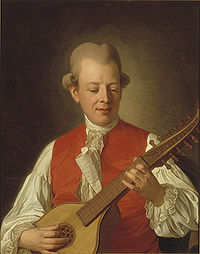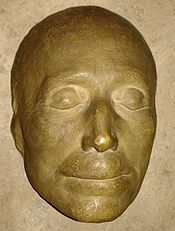- Carl Michael Bellman
-
 Carl Michael Bellman (help·info) (4 February 1740 – 11 February 1795) was a Swedish poet and composer. Bellman is a central figure in the Swedish song tradition and remains a very important influence in Swedish music, as well as in Scandinavian literature in general, to this day.
Carl Michael Bellman (help·info) (4 February 1740 – 11 February 1795) was a Swedish poet and composer. Bellman is a central figure in the Swedish song tradition and remains a very important influence in Swedish music, as well as in Scandinavian literature in general, to this day.Bellman was born in Stockholm. His main works are the Songs of Fredman (Fredmans sånger) and the Epistles of Fredman (Fredmans epistlar), each including some 70 songs, many of which are about sociable drinking and/or designed for the occasion of the same. But this aspect of his songs is not the main reason he has become such an icon in the Scandinavian song tradition. A master of rhyme and rhythm, with a wonderful sense for combining words and music, he wrote songs that were innovative and original in form (parodying and refreshing contemporary literary styles was one of his specialities), as well as challenging in subject matter. On the surface, his songs centred to a large extent around themes like the joy of inebriation and the pursuit of sexual pleasure. Against this backdrop, however, he manages to elucidate the tender and fleeting themes of love, death, and the elusive qualities of the "present", the here-and-now, in a unique and moving manner. His songs reflect aspects of the life of the common man in 18th century Stockholm, but by his composition Gustafs skål, an informal royal anthem, he had also acquired the patronage of King Gustav III of Sweden. Some of the characters in his songs are the clockmaker Fredman, the prostitute Ulla Winblad, the ex-soldier, now alcoholic Mowitz and Fader Berg, a virtuoso on several instruments. Some of these were based on living models, some probably not. His songs often make references to Greek and Roman mythological characters such as the ferryman Charon and the God of wine and pleasure, Bacchus.
Bellman mostly played the cittern.
Contents
Legacy
The songs of Bellman have been recorded by modern Swedish artists such as the late Cornelis Vreeswijk, Evert Taube, his son Sven-Bertil Taube, Fred Åkerström, rock musician Joakim Thåström, and even metal music bands as Candlemass or black metal band Marduk. They are also frequently used as choral music and as drinking songs. Important interpreters of Bellman's songs include Fred Åkerström and Cornelis Vreeswijk.
Bellman has been translated into English several times, most notably by Paul Britten Austin, and there have been many translations into German (by Hannes Wader and many others). Also the German Communist leader Karl Liebknecht liked to sing the songs of Bellman, but he was able to do so in Swedish. Hans Christian Andersen was one of the first to translate Bellman into Danish.
Bellman's songs have also been translated and recorded in Icelandic (by Bubbi), Italian, French, Finnish (for instance by Vesa-Matti Loiri), Russian, Chuvash and Yiddish. English interpretations have been recorded by William Clauson, Martin Best, Sven-Bertil Taube, Roger Hinchliffe and Martin Bagge.
There are a number of books in English with translations of Bellman's work. The authors include Charles Wharton Stork,[1] Hendrik Willem van Loon,[2] Paul Britten Austin,[3] and historian Michael Roberts.[4] In English the most thorough treatment of Bellman's life is also by Paul Britten Austin.[5]
Bellman jokes
Bellman's life inspired the "Bellman joke", a type of joke told by Swedish children. These jokes appeared first in the 19th century. They have since evolved and the "Bellman jokes" of today have no connection to the poet. Usually they refer to Bellman as a lunatic acting in the extreme.
Selected works
- Bacchi Tempel (1783)
- Fredmans Epistlar (Epistles of Fredman) (1790)
- Fredmans Sånger (Songs of Fredman) (1791)
References
- ^ Anthology of Swedish Lyrics from 1750 to 1915 by Charles Wharton Stork, (New York: The American-Scandinavian Foundation, 1917).
- ^ The Last of the Troubadours by Hendrik Willem Van Loon and Grace Castagnetta, (New York: Simon and Schuster, 1939).
- ^ Fredman's Epistles and Songs by Paul Britten Austin, (Stockholm: Proprius, 1999).
- ^ Epistles and Songs by Michael Roberts, (Grahamstown, three volumes, 1977-1981).
- ^ The Life and Songs of Carl Michael Bellman by Paul Britten Austin, (New York: The American-Scandinavian Foundation, 1967).
External links
- Free scores by Carl Michael Bellman in the Choral Public Domain Library (ChoralWiki)
- Quicktime files Bellman songs from Litteraturbanken Choose "Författare" (author). litteraturbanken.se
- Carl Michael Bellman on Swedish Wikisource
- Bellman.net
- Projekt Runeberg: Carl Michael Bellman, runeberg.org
- Carl Michael Bellman page at Kuusankoski Public Library. kirjasto.sci.fi
- Carl Michael Bellman page at PoemHunter.com
- Bellman in English at the Internet Archive: pp. 3–17. archive.org
Categories:- 1740 births
- 1795 deaths
- People from Stockholm
- Swedish composers
- Swedish-language poets
- Uppsala University alumni
- 18th-century Swedish people
Wikimedia Foundation. 2010.


